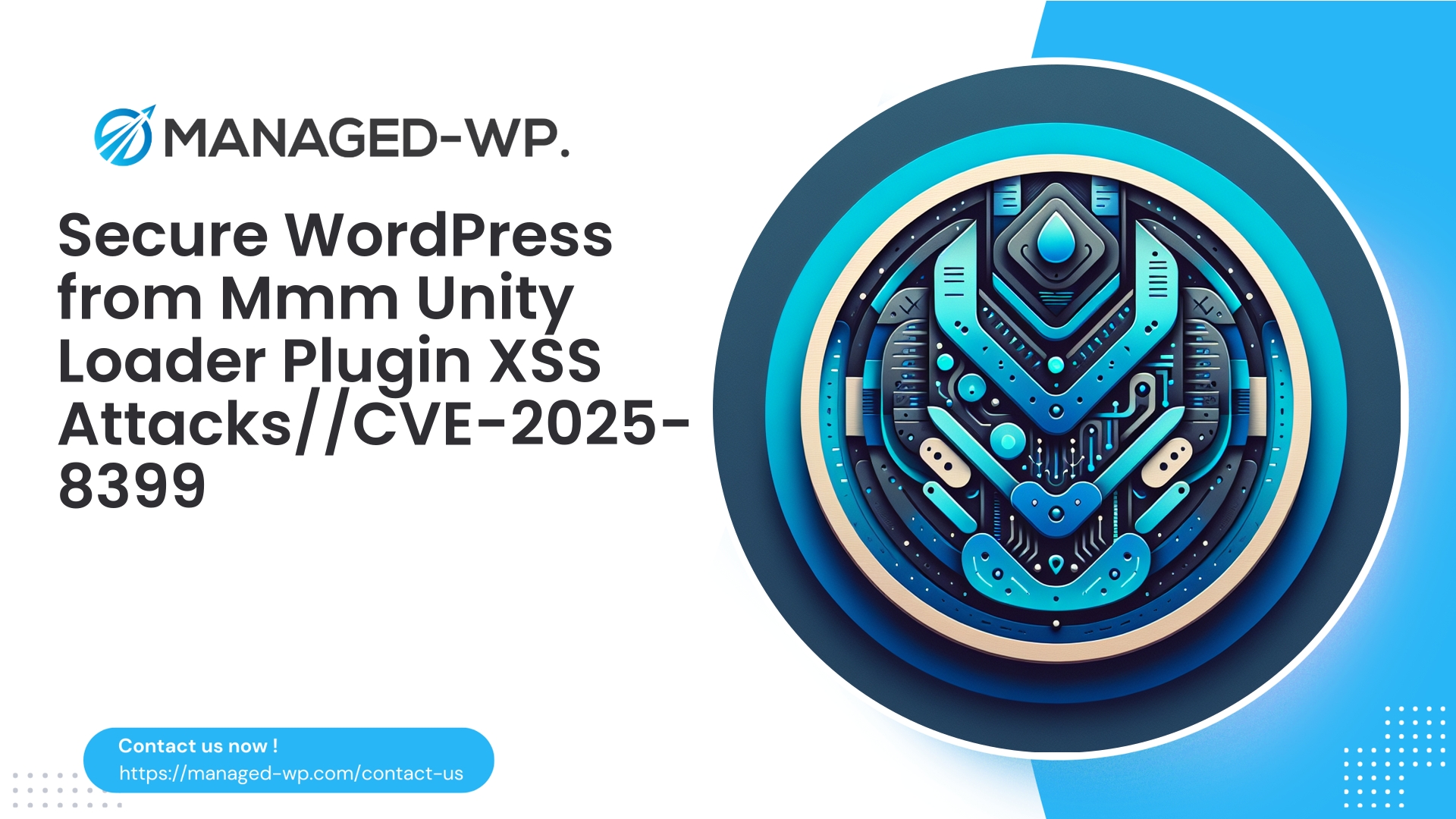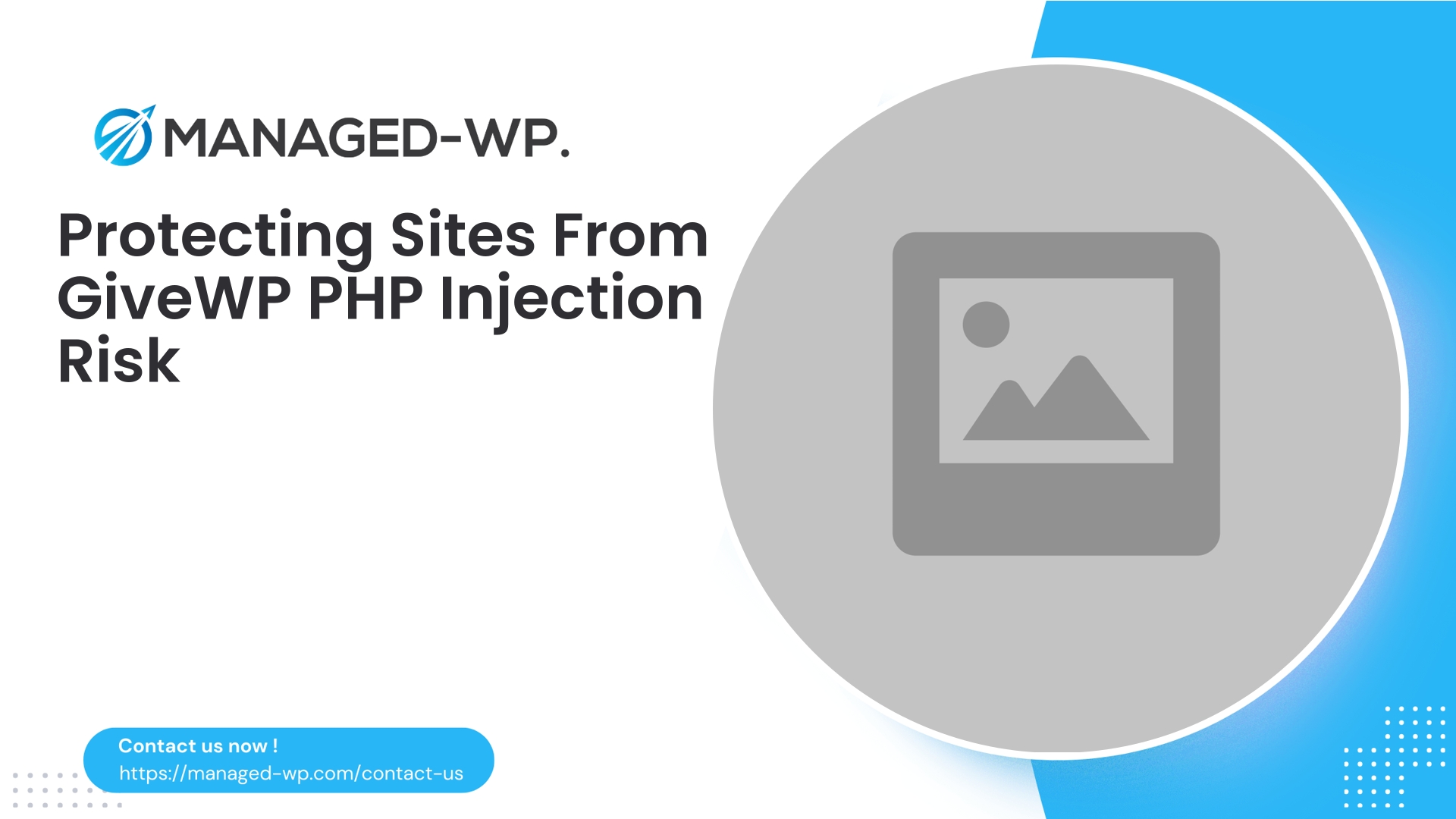
| 插件名稱 | MMM Unity 載入器 |
|---|---|
| 漏洞類型 | 跨站腳本 (XSS) |
| CVE編號 | CVE-2025-8399 |
| 緊急 | 高的 |
| CVE 發布日期 | 2025-08-04 |
| 來源網址 | 看詳情 |
了解 Mmm Unity Loader 外掛程式(<=1.0)中最新的跨站腳本漏洞
跨站腳本攻擊 (XSS) 仍然是 WordPress 社群面臨的嚴重安全問題,它通常源自於外掛程式對使用者輸入處理不當。新揭露的儲存型 XSS 漏洞會影響 WordPress 的安全。 Mmm Unity Loader 外掛程式(版本 1.0 及更早版本),允許經過驗證的貢獻者使用該外掛程式註入惡意腳本。 屬性 範圍。
在這份詳盡的概述中,Managed-WP 分享了關於此漏洞的性質、其對您的 WordPress 網站的影響,以及您可以採取哪些切實可行的安全策略來保護您的網站——即使在官方補丁發布之前。作為值得信賴的 WordPress 安全託管服務提供者,我們的目標是為您提供及時可靠的資訊。
Mmm Unity Loader插件漏洞究竟是什麼?
Mmm Unity Loader 外掛程式常用於 WordPress 網站,用於嵌入基於 Unity 的互動元素。該漏洞被識別為… 儲存型跨站腳本攻擊 (XSS) 影響 1.0 及更低版本的一個缺陷。它允許用戶… 貢獻者等級或更高權限 利用插件的 屬性 參數,注入惡意 JavaScript 程式碼,程式碼會被儲存並在其他使用者的瀏覽器中執行。
漏洞工作原理
- 儲存型 XSS: 與反射型 XSS 不同,這種儲存型 XSS 涉及惡意腳本永久保存在伺服器上,然後在其他使用者查看受影響的內容時傳遞給他們並由他們執行。
- 屬性參數: 該插件對該參數的處理方式不安全,可能導致惡意腳本注入。
- 權限等級: 利用漏洞需要貢獻者層級的存取權限,這意味著匿名訪客無法觸發漏洞,但受感染或惡意貢獻者會帶來安全風險。
為什麼儲存型 XSS 攻擊如此重要
儲存型 XSS 漏洞會帶來重大風險,包括:
- 持續性威脅: 注入的惡意程式碼會一直保持活動狀態,直到被偵測到並移除。
- 廣泛影響: 任何與受感染內容互動的訪客或使用者都會受到感染。
- 嚴重的剝削後果: 包括竊取 cookie、劫持會話、未經授權的操作、重定向和惡意惡意軟體感染。
技術細節及嚴重性評估
| 方面 | 細節 |
|---|---|
| 外掛 | Mmm Unity Loader |
| 易受攻擊的版本 | ≤ 1.0 |
| 漏洞類型 | 儲存型跨站腳本攻擊(XSS) |
| 所需權限 | 貢獻者或更高級別 |
| 補丁狀態 | 目前尚無官方修復方案。 |
| CVSS評分 | 6.5(中度風險) |
| OWASP 類別 | A7:跨站腳本攻擊 |
| CVE標識符 | CVE-2025-8399 |
影響概要
雖然 CVSS 評分將此漏洞評為中等風險,但由於缺乏官方補丁,其威脅性會進一步加劇,尤其對於擁有多個貢獻者或權限控制寬鬆的網站而言。潛在影響包括:
- 在使用者瀏覽器中執行任意 JavaScript 程式碼。
- 存在權限提升或網站篡改的可能性。
- 竊取敏感用戶數據,例如身份驗證 cookie 和令牌。
- 垃圾郵件注入或重定向造成的負面SEO影響。
為什麼 WordPress 網站經常面臨外掛漏洞的風險
WordPress 的可擴充外掛架構既是優點也是潛在的安全隱憂。導致漏洞的主要原因包括:
- 快速開發週期: 插件可能在未經全面安全審查的情況下建立或更新。
- 更新延遲或缺失: 儘管已知存在漏洞,但某些插件仍未打補丁。
- 輸入驗證不完善: 許多插件對輸入進行清理或驗證不足,從而導致注入漏洞。
- 使用者角色配置錯誤: 權限過高的角色會讓使用者做出意想不到或有害的行為。
Mmm Unity Loader 漏洞清楚地表明了威脅行為者如何利用中級權限來入侵 WordPress 網站。
針對此 XSS 漏洞的緩解和保護策略
在官方更新發布之前,網站所有者應採取多種預防措施來降低風險。
1. 限制使用者權限並審查貢獻者角色
- 最小特權原則: 盡可能限制使用者權限,使貢獻者無法存取有風險的插件參數。
- 定期審計: 定期審查貢獻者帳戶,檢查是否有異常活動或過期憑證。
- 雙重認證(2FA): 要求所有具有編輯權限的使用者啟用雙重身份驗證。
2. 停用或限制使用 Mmm Unity Loader 插件
- 如果 Unity 內容並非必不可少,請考慮暫時停用該插件,直到安全性修補程式可用為止。
- 在卸載或歸檔存在漏洞的版本之前,請先安全匯出所有重要內容。
3. 採用強大的網路應用程式防火牆(WAF)
配置良好的 Web 應用程式防火牆 (WAF) 可以作為有效的盾牌:
- 虛擬補丁: 阻止針對已知易受攻擊的插件輸入的漏洞利用嘗試,例如
屬性. - 惡意軟體檢測: 及早發現注入的腳本或異常載重。
- 日誌記錄和警報: 透過追蹤可疑活動,實現主動事件回應。
- OWASP十大防護: 除了此特定 XSS 問題之外,它還能防止多種注入缺陷。
4. 對自訂程式碼中的使用者輸入進行清理和轉義
- 審核所有與插件參數互動的自訂程式碼或短代碼。
- 使用 WordPress 的清理功能,例如
sanitize_text_field(),wp_kses()並採取適當的逃脫措施以防止直接注射。 - 避免將未經處理的輸入直接複製到網頁中。
5. 保持定期備份和事件應對準備
- 確保您的網站和資料庫有可靠的異地備份。
- 制定並測試事件回應計劃,以便在發生安全漏洞時能夠快速恢復。
為什麼僅僅等待官方修復是不夠的
許多 WordPress 管理員因為拖延緊急安全措施而使網站面臨風險,他們錯誤地認為「中等」風險的漏洞不會吸引攻擊者。但實際上,攻擊者會持續掃描並利用漏洞,一旦漏洞被揭露,他們就會立即發動攻擊。
由於目前還沒有針對 Mmm Unity Loader 漏洞的官方補丁,因此立即採取主動防禦措施至關重要。
為您的 WordPress 網站建立主動安全態勢
這項漏洞凸顯了採取分層式、高警覺性安全策略的重要性。主要建議包括:
- 迅速行動: 盡快解決安全風險。
- 控制使用者存取: 定期加強並核實使用者權限。
- 持續監控: 利用工具分析流量並偵測異常情況。
- 利用虛擬補丁: 部署基於防火牆的防護措施,抵禦零日漏洞。
- 教育你的團隊: 對撰稿人和編輯進行安全最佳實踐的培訓。
利用主動防火牆保護增強您的 WordPress 安全性
在廠商未發布 Mmm Unity Loader 更新的情況下,最可靠的臨時防禦措施是實施… 託管式 WordPress 防火牆解決方案 那:
- 監控並阻止針對插件輸入的攻擊嘗試。
- 執行自動惡意軟體掃描以偵測安全漏洞。
- 緩解 OWASP Top 10 Web 應用程式風險,包括 XSS。
- 提供虛擬修補程式功能,可立即抵禦新的漏洞。
結合這些防禦措施,可以顯著降低風險,即使在官方補丁發布之前也能將風險降至最低。
現在您可以採取的措施:使用託管防火牆和安全掃描來保護您的網站
無論是管理客戶網站、代理商網站還是您自己的博客,整合安全解決方案都不可或缺。首先:
- 部署託管式 WordPress 防火牆 強制執行入站和出站規則。
- 啟用即時惡意軟體掃描和清理 為了保護您的環境安全。
- 監控使用者活動和權限變更 及早發現可疑行為。
- 及時接收安全警報 為了防範新出現的威脅。
免費體驗 WordPress 基本安全防護-試試我們的免費保護計劃
在 Managed-WP,保護您的 WordPress 網站既簡單又經濟實惠。 基本免費套餐 優惠:
- 由專家管理、具備智慧威脅過濾功能的防火牆。
- 為您的網站流量提供無限頻寬支援。
- Web應用程式防火牆(WAF)可抵禦OWASP十大風險,包括跨站腳本攻擊。
- 用於快速識別風險的自動化惡意軟體偵測和掃描工具。
立即保護您的 WordPress 網站免受新興威脅的侵害 並享受專家支持帶來的安心保障。
結語:警覺是抵禦 WordPress 外掛漏洞的最佳防禦措施
Mmm Unity Loader 儲存型 XSS 漏洞是一個重要的警告:
- 任何插件本身都不安全。 缺乏適當的維護和監管。
- 使用者權限和正確的輸入驗證 仍然是降低風險的關鍵控制點。
- 立即採取緩解措施至關重要。即使官方尚未發布修復程式。
保護您的 WordPress 網站需要採取綜合方法,包括託管防火牆、嚴格的使用者存取管理和持續監控。隨時了解最新資訊並做好準備,才能有效應對不斷演變的網路威脅。
注意安全,妥善管理您的插件,並利用強大的安全工具來保護您的 WordPress 網站。
感謝您信任 Managed-WP,將您的 WordPress 安全知識託付給我們-您網站的安全是我們的首要任務。

















